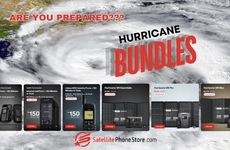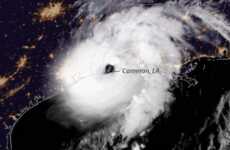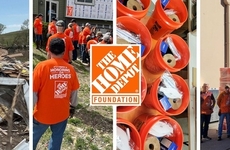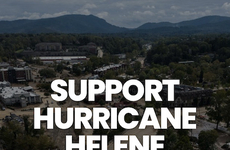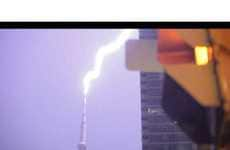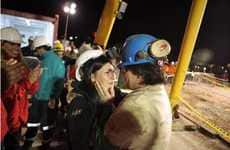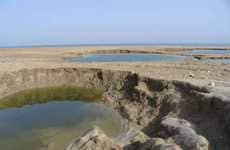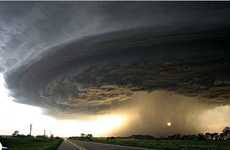
Contrasting Hurricane Gustav and Katrina
Sandra Winn — September 3, 2008 — Social Good
References: online.wsj
Thank goodness Hurricane Gustav veered west of New Orleans, came in with winds to the south instead of east, and weakened before making landfall on August 31st. That said, there is a lot of internet buzz and many discussions taking place on news stations today, regarding the difference in preparations made for Hurricane Gustav as compared to Hurricane Katrina. What is the difference? Here's a refresher...
Residents of New Orleans were only given a 12 hour mandatory evacuation notice before Hurricane Katrina made landfall -- after President Bush called then Governor Kathleen Blanco and appealed for her state to implement such. Unfortunately, 12 hours was not enough time to evacuate millions of residents. Governor Blanco, Mayor Ray Nagin, and other officials had plenty of warning that a major hurricane was approaching.
Do you remember the day after Katrina hit? News outlets everywhere were asking, "Why were buses not used to evacuate the poor, elderly, and sick, as was called for in Louisiana States hurricane guidelines?" Instead of answers, we heard blame, blame, blame. Considering the fact that Louisiana didn't follow already established procedures to get its people the heck out of dodge, I think the majority of blame falls on state and local levels. It pangs me to write this, but blame falls on individual levels as well.
As a resident of Pensacola, FL, I can attest to the fact that many of the people who died here when Hurricane Ivan paid us an unwelcome visit suffered from, "It won't happen to me syndrome." Another reason people use to stay is, "Well, back when Hurricane Betsy came through years ago...", they'll then continue to explain that nothing happened to their home and so they thought Ivan wasn't "as bad." Those are common excuses used by people in hurricane-prone cities as reasons not to heed evacuation orders. Of course, one more reason people don't evacuate is because they cannot afford it, which is sad, but true.
When Hurricane Gustav appeared to be making a beeline towards New Orleans, it was apparent that the same mistakes would not be made. Officials learned their lesson from Katrina and started evacuating medical patients, the elderly, and the poor without vehicles. 95% of New Orleans residents, fled this time because they did not want to endure the same fear and hardships as they did in 2005.
During Katrina, many National Guardsmen were off in Iraq and supplies were short in the US because they were being used in the War on Iraq. Bridges collapsed too with Katrina, and units could not make it over to the Super Dome or the city. However, despite that fact, people were being rescued from rooftops by the Coast Guard -- they did an amazing job!
This time around, the National Guard was called upon early. After Hurricane Katrina, New Orleans began stockpiling water, food, and blankets, should another devastating hurricane hit the area. How wonderful those provisions were not needed in massive quantities.
Apart from those couple of things, there is not much to compare. New Orleans did not get the brunt of Hurricane Gustav. As for the levees standing up? Well, I'm not so sure Hurricane Gustav was the storm to "test" them properly. Hurricane Gustav came in at an angle that reduced the expected storm surge so how can we really know? And, if you read the story from The Wall Street Journal in the excerpt link provided, you'll see there is reason for concern as water poured over a flood wall, even though hurricane strength winds were not reached. We can't compare rescue efforts because no one needed to be rescued -- something which makes everyone happy.
Tonight the big question being posed on television and the web is whether people will evacuate should another hurricane barrel towards New Orleans. Some residents who left are now upset because they can't go home and, of course, Gustav wasn't the heavy hitter he was made out to be. Honestly, I doubt they will.
Though Katrina proved a valuable lesson, Hurricane Gustav came off as crying wolf and people may be a bit more reluctant in leave next time.
Residents of New Orleans were only given a 12 hour mandatory evacuation notice before Hurricane Katrina made landfall -- after President Bush called then Governor Kathleen Blanco and appealed for her state to implement such. Unfortunately, 12 hours was not enough time to evacuate millions of residents. Governor Blanco, Mayor Ray Nagin, and other officials had plenty of warning that a major hurricane was approaching.
Do you remember the day after Katrina hit? News outlets everywhere were asking, "Why were buses not used to evacuate the poor, elderly, and sick, as was called for in Louisiana States hurricane guidelines?" Instead of answers, we heard blame, blame, blame. Considering the fact that Louisiana didn't follow already established procedures to get its people the heck out of dodge, I think the majority of blame falls on state and local levels. It pangs me to write this, but blame falls on individual levels as well.
As a resident of Pensacola, FL, I can attest to the fact that many of the people who died here when Hurricane Ivan paid us an unwelcome visit suffered from, "It won't happen to me syndrome." Another reason people use to stay is, "Well, back when Hurricane Betsy came through years ago...", they'll then continue to explain that nothing happened to their home and so they thought Ivan wasn't "as bad." Those are common excuses used by people in hurricane-prone cities as reasons not to heed evacuation orders. Of course, one more reason people don't evacuate is because they cannot afford it, which is sad, but true.
When Hurricane Gustav appeared to be making a beeline towards New Orleans, it was apparent that the same mistakes would not be made. Officials learned their lesson from Katrina and started evacuating medical patients, the elderly, and the poor without vehicles. 95% of New Orleans residents, fled this time because they did not want to endure the same fear and hardships as they did in 2005.
During Katrina, many National Guardsmen were off in Iraq and supplies were short in the US because they were being used in the War on Iraq. Bridges collapsed too with Katrina, and units could not make it over to the Super Dome or the city. However, despite that fact, people were being rescued from rooftops by the Coast Guard -- they did an amazing job!
This time around, the National Guard was called upon early. After Hurricane Katrina, New Orleans began stockpiling water, food, and blankets, should another devastating hurricane hit the area. How wonderful those provisions were not needed in massive quantities.
Apart from those couple of things, there is not much to compare. New Orleans did not get the brunt of Hurricane Gustav. As for the levees standing up? Well, I'm not so sure Hurricane Gustav was the storm to "test" them properly. Hurricane Gustav came in at an angle that reduced the expected storm surge so how can we really know? And, if you read the story from The Wall Street Journal in the excerpt link provided, you'll see there is reason for concern as water poured over a flood wall, even though hurricane strength winds were not reached. We can't compare rescue efforts because no one needed to be rescued -- something which makes everyone happy.
Tonight the big question being posed on television and the web is whether people will evacuate should another hurricane barrel towards New Orleans. Some residents who left are now upset because they can't go home and, of course, Gustav wasn't the heavy hitter he was made out to be. Honestly, I doubt they will.
Though Katrina proved a valuable lesson, Hurricane Gustav came off as crying wolf and people may be a bit more reluctant in leave next time.
Trend Themes
1. Improved Evacuation Preparedness - Opportunity for businesses to develop innovative evacuation plans, tools, and strategies to ensure the safety of residents during natural disasters.
2. Resilient Infrastructure - Opportunity for industries to invest in creating resilient infrastructure, including fortified levees and flood walls, to better withstand the impact of hurricanes and protect communities.
3. Effective Disaster Response - Opportunity for organizations to improve disaster response capabilities and coordination, leveraging technology and data to ensure timely and efficient rescue and aid operations.
Industry Implications
1. Emergency Management - Disruptive innovation opportunities exist in developing advanced technologies and systems for emergency management agencies to enhance preparedness and response capabilities during natural disasters.
2. Construction and Infrastructure - Opportunity to provide cutting-edge engineering and construction solutions for building resilient infrastructure that can better withstand the impact of hurricanes and other natural disasters.
3. Technology and Data Analytics - Opportunity to develop innovative technologies and data analytics platforms that can improve real-time monitoring, forecasting, and response decision-making during natural disasters.
0.7
Score
Popularity
Activity
Freshness

